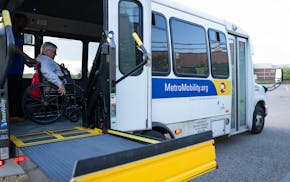The debate is growing over the cost and independence of suburban transit.
Key players in the southern suburbs are seething over a decision by the Republican-led Metropolitan Council to highlight on its website a commentary article by a DFL state legislator questioning whether separate suburban transit services should exist. The article was written by Rep. Alice Hausman of St. Paul and published in the Star Tribune South Extra on July 7.
Met Council Chairman Peter Bell responded with a written statement asserting that the real issue is that the subsidy per passenger for suburban transit providers is nearly twice that of Metro Transit, which runs the metro area's main service.
Lurking behind it all is a growing anxiety among the so-called "opt-outs" -- suburbs that decades ago jumped off the mother ship and organized their own transit routes -- that their autonomy is in danger. The Legislative Auditor is compiling a report looking at the whole picture.
Despite the Met Council's denials, many in the suburbs have concluded that it wants to ultimately fold the opt-outs into the main system once again. And the prominence given to a commentary piece arguing for just such a move did nothing to soothe their suspicions.
Jon Ulrich, a member of the Minnesota Valley Transit Authority (MVTA) board, told a group of civic leaders a few days ago that he considers it "really inappropriate" for a government agency to give such prominence to "one person's opinion attacking STA," meaning the Suburban Transit Association.
Craig Peterson, the appointed Met Council member representing a swath of southwest suburbs, did not exactly leap to the agency's defense.
Addressing the same group, he called the decision to draw public attention to the article "really confusing" considering that "we have a committee working with the STA to develop a better working relationship. There's a total disconnect between that goal and posting [a link to] this letter on the website."
He added: "As council members, we don't deal with STA or the opt-outs. That's staff's role. And that's part of the disconnect. The council doesn't have a sensitive awareness of what's going on. ... I do."
He promised to follow up on it. The link to the opinion piece later disappeared from the council's home page.
Asked what led the council first to post it and then to remove it, the council responded by e-mailing a written statement from Bell saying it was posted because it contained "factual information that was relevant to the issues" being discussed.
He didn't say why the link was removed.
It's important for people to know, he wrote, that suburban transit operators get an out-sized share of subsidies: nearly 15 percent, while providing about 6 percent of the rides.
Bell added:
• In 2008, the subsidy per bus passenger for Metro Transit averaged $2.20. The subsidy per bus passenger for suburban providers, meanwhile, averaged $4.28.
• Looking just at express bus service, the subsidy per passenger for Metro Transit routes averaged $2.31, compared with $2.71 for suburban providers.
• For suburban local service, the subsidy per passenger for the Metro Transit averaged $3.65, "compared with a whopping $9.99 for the suburban providers," Bell said.
MVTA executive director Bev Miller responded by e-mailing three charts -- based, she said, on Met Council data.
The first, in her words, "demonstrates that many/most of the lowest-subsidy express routes in the region are operated by suburban transit providers." MVTA route 460, at well under a buck per passenger, comes in second on a list of 99 weekday express routes. About half the top group are suburban.
Another chart asserts that MVTA itself is more efficient than Metro Transit, while the third maintains that for express services alone, suburban providers as a group are more efficient than Metro Transit's express services.
MVTA board members have expressed confidence that the nonpartisan Legislative Auditor will sort through those kinds of arguments and come up with a common base of facts to which all sides can agree.
David Peterson • 952-882-9023
St. Paul 18-year-old killed in Inver Grove Heights crash

Riders say Metro Mobility is a lifeline, but sometimes it makes their lives miserable
Minnesota eyes 'sprint' paramedics to ease rural shortages, lagging emergency response

College graduations will be twice as sweet for class whose high school celebrations happened online

